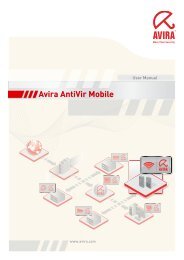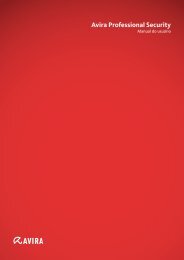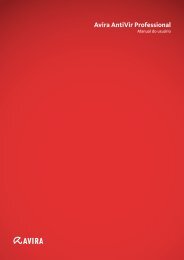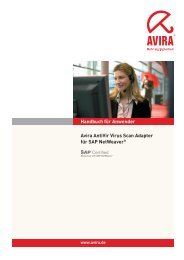User Manual
User Manual
User Manual
Create successful ePaper yourself
Turn your PDF publications into a flip-book with our unique Google optimized e-Paper software.
Viruses and more<br />
reason he is never addressed. If an attacker examines a network for the weak points and<br />
uses the services which are offered by a honeypot, it is logged and an alert is triggered.<br />
Macro viruses<br />
Macroviruses are small programs that are written in the macro language of an application<br />
(e.g. WordBasic under WinWord 6.0) and that can normally only spread within documents<br />
of this application. Because of this, they are also called document viruses. In order to be<br />
active, they need that the corresponding applications are activated and that one of the<br />
infected macros has been executed. Unlike "normal" viruses, macro viruses consequently<br />
do not attack executable files but they do attack the documents of the corresponding host<br />
application.<br />
Pharming<br />
Pharming is a manipulation of the host file of web browsers to divert enquiries to spoofed<br />
websites. This is a further development of classic phishing. Pharming fraudsters operate<br />
their own large server farms on which fake websites are stored. Pharming has established<br />
itself as an umbrella term for various types of DNS attacks. In the case of a manipulation<br />
of the host file, a specific manipulation of a system is carried out with the aid of a Trojan or<br />
virus. The result is that the system can now only access fake websites, even if the correct<br />
web address is entered.<br />
Phishing<br />
Phishing means angling for personal details of the Internet user. Phishers generally send<br />
their victims apparently official letters such as emails that are intended to induce them to<br />
reveal confidential information to the culprits in good faith, in particular user names and<br />
passwords or PINs and TANs of online banking accounts. With the stolen access details,<br />
the phishers can assume the identities of the victims and carry out transactions in their<br />
name. What is clear is that: banks and insurance companies never ask for credit card<br />
numbers, PINs, TANs or other access details by email, SMS or telephone.<br />
Polymorph viruses<br />
Polymorph viruses are the real masters of disguise. They change their own programming<br />
codes - and are therefore very hard to detect.<br />
Program viruses<br />
A computer virus is a program that is capable of attaching itself to other programs after<br />
being executed and cause an infection. Viruses multiply themselves unlike logic bombs<br />
and Trojans. In contrast to a worm, a virus always requires a program as host, where the<br />
virus deposits its virulent code. The program execution of the host itself is not changed as<br />
a rule.<br />
Avira Professional Security - <strong>User</strong> <strong>Manual</strong> (Status: 30 Mar. 2012) 85

















